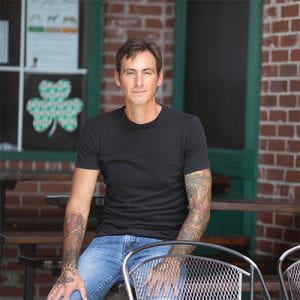Dean Stone releases his book Christianity and Horror Cinema
For as long as he can remember, Bryan Stone, now the Leighton K. Farrell Endowed Dean at Perkins School of Theology, has loved scary movies. He recalls, for example, a theater visit for the release of Alien in 1979 and encountering what he describes as “the transcendent beyond.” That cinematic experience, and many others that followed, sparked a decades-long journey exploring the intersection of theology and fear from the perspective of film.
While horror may seem like an unlikely genre for theological exploration, Dean Stone believes it may be one of the most spiritually potent. His new book, Christianity and Horror Cinema, invites readers to embrace the spiritual and the psychological unknown — and, in doing so, uncover profound truths about evil, redemption, and the sacred.
Roots tying back to Christianity
When asked about the purpose of the book, Stone commented, “Christianity and Horror Cinema explores ways that Christian beliefs, spiritualities, practices, and symbols provide the religious and existential ‘depths’ out of which the monsters of Western horror cinema have emerged. I argue that they are, in several respects, the monsters for which Christians are responsible. Horror cinema preys on Christianity’s narrative, moral, cultural, and aesthetic traditions; reverses them; upends them; inverts them; and offends them. But it also reflects and relies on them.”
Horror — the genre of confrontation
Stone believes horror is uniquely positioned to challenge viewers. “What horror film does is confront us,” he explained. “It confronts us with our vulnerabilities, our finitude — those things that we have repressed and put way down deep. And it brings it all back up in front of us and confronts us.”
For Christians, that confrontation isn’t something to avoid. Instead, Stone urges believers to recognize the value of facing what we fear — both in art and in faith.
“I think of holy fear of God in a good way — that we learn that God is not just this sentimental gift giver, but One who is wholly other than us.” — Dean Bryan Stone
Stone notes that many horror films share common religious reference points: “The overlap between theological themes and horror themes is amazing. Good versus evil. What happens after death? What is our relationship to nature? What does it mean to be a human being? All those questions are explored in horror films.”
From cult classics to modern movies
Readers can expect hundreds of references to horror films from a variety of subgenres. Vampires, zombies, ghosts, witches, demons, nature horror, slashers and psychological thrillers each have a section dedicated to them in the book. From cultural staples like The Exorcist (1973) to modern folk horror like The Witch (2015), the book analyzes the evolution of horror’s theological imagination.
Each chapter traces the history of that subgenre, taking up a theological analysis of ways that horror cinema capitalizes on ambiguities, contradictions, anxieties and tensions in Christianity—for example, its treatment of the body, nature, sexuality, women, or those it deems pagan or religiously “other.”
Stone hopes once readers finish the book, they will reflect and gather new meanings during future movie viewings. He envisions that healthier conversations around contemporary art and media will be embraced by younger leaders.
 Advancing studies and culture for Perkins
Advancing studies and culture for Perkins
“My approach to evangelism and ministry is that Christians, and Christian ministers, need to understand culture — they need to understand the culture around them,” Stone said. “If you don’t, you’re going to be just lobbing Scripture over people without any connection to their lives or without understanding where people’s fears are, as well as where their hopes are.”
He translates this importance of cultural awareness to his future goals with Perkins.
“I don’t want to be a seminary that’s stuck in an ivory tower. Here at Perkins, we study the Bible or Christian history and doctrine, but while always relating it to the contemporary world, to culture. And so, I want to be very engaged with interfacing theology and culture. But that’s definitely not new to Perkins. We’ve been doing it for a long time. But that’s one of my highest priorities,” Stone said.
With Christianity and Horror Cinema officially published, Stone invites readers into a deeper understanding of the sacred and the scary — and what it reveals about faith.
The book is now available on Amazon.











